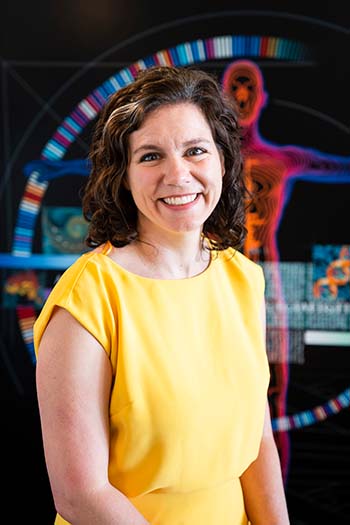Campus News
Karen Miga named 2023 Searle Scholar to study uncharted regions of the human genome
Karen Miga, assistant professor of biomolecular engineering at UC Santa Cruz, has been named a 2023 Searle Scholar.

Karen Miga, assistant professor of biomolecular engineering at UC Santa Cruz, has been named a 2023 Searle Scholar. This prestigious award will support Miga’s research on constitutive heterochromatin, regions of the genome that have been previously unexplored due to their complexity.
Miga aims to create the first-ever maps of these regions using the genomes of people from a diverse range of populations. This will give insight into how these regions are regulated and inherited, and how they may contribute to disease.
“This is a real honor to be recognized as a Searle Scholar,” Miga said. “For so long these repeat-rich regions of our genome have been ignored. It is exciting to think about the new discoveries we will make about the genome structure and function of satellite DNAs over the next three years with this support.”
Constitutive heterochromatin are regions of DNA recognized to be crucial for the maintenance of genomic integrity and ensuring chromosomes separate properly when the cell divides. These regions are known to be transcriptionally silent, meaning the genes are “turned off.”
Constitutive heterochromatin regions are highly repetitive and densely packed, and have been historically difficult to clone, sequence, and assemble correctly. Because of this, these regions have represented the largest, most persistent gaps across all genome reference assemblies.
However, with recently improved DNA sequencing and assembling methods that make it possible to create complete, telomere-to-telomere genome sequences — methods pioneered by Miga and others — it is now possible to return to these regions to better understand the complex biological mechanisms that lock them in a “turned off” state. Miga will create the first high-resolution maps of these areas and study how they are inherited by observing them in genomes from a three-generation family line.
This work builds on Miga’s expertise on the function of long stretches of repetitive DNA sequences, which have been previously regarded by scientists as “junk DNA.” Her interest in these complex regions brought her to the UC Santa Cruz Genomics Institute, which has been pioneering work in genomic sequencing and assembly for years. Since joining UCSC as a postdoc and now a faculty member, Miga has been a leader on groundbreaking human genomics projects including the Telomere-to-Telomere Consortium’s first truly complete sequence of a human genome and the Human Pangenome Research Consortium’s first draft of a human pangenome reference to increase equity in genetic research.
The Searle Scholar Program supports the independent research of exceptional young faculty in the biomedical sciences and chemistry. Each scholar receives an award of $300,000 in flexible funding for their research over three years.
This year, 15 scholars were chosen from 175 applications. Since 1981, 677 scientists have been named Searle Scholars, many of whom have received prestigious distinctions including MacArthur genius grants and Nobel prizes.
Past Searle Scholars from UCSC include Assistant Professor of Molecular, Cell, and Developmental (MCD) Biology Upasna Sharma in 2020, Assistant Professor of MCD Biology Joshua Arribere in 2019, Professor of Biomolecular Engineering Richard (Ed) Green in 2011, and Professor of MCD Biology Melissa Jurica in 2005.
The Searle Scholars Program is funded through the Searle Funds at The Chicago Community Trust and administered by Kinship Foundation.